- Home
- T. Kingfisher
What Moves the Dead Page 2
What Moves the Dead Read online
Page 2
I turned to face the owner of the voice just as he stepped forward. In the flickering light of the candle, I beheld my old friend Roderick Usher. He had been a friend of my youth and under my command in the war through an accident of fate. I knew his face as well as I knew my own.
And I swear to you, if I had not heard his voice, I would not have recognized him.
* * *
Roderick Usher’s skin was the color of bone, white with a sallow undertone, a nasty color, like a man going into shock. His eyes had sunk into deep hollows tinged with blue and if there was a spare grain of flesh left on his cheeks, I couldn’t see it.
The worst of it, though, was his hair. It floated in the air like spider silk, and I told myself that it was a trick of the candlelight that made it look white rather than blond. Either way, it was now all flyaway wisps, like strands of fog, drifting in a halo around his head. The very young and the very old have hair like that. It was unsettling to see it in a man a year my junior.
Both Roderick and Madeline had always been rather pale, even when we were children. Later, in the war, Roderick could be relied upon to burn rather than tan. They both had large, liquid eyes, the sort that are called doe-like by poets, although those poets have mostly never hunted deer, because neither of the Ushers had giant elliptical pupils and they both had perfectly serviceable whites. I could see rather too much of the whites of Roderick’s eyes right now, in fact. His eyes gleamed feverishly in that unnaturally pale face.
“Usher,” I said, “you look like you’ve been dragged arse-first through hell.”
He gave a choked laugh and clutched at his head. “Easton,” he said again, and when he lifted his head, there was a little more of the Roderick I knew in his expression. “Oh God, Easton. You have no idea.”
“You’ll have to tell me,” I said. I put an arm around his shoulders and thumped him, and there was no flesh on his bones at all. He’d always been rawboned, but this was something else again. I could feel individual ribs. If Hob had ever looked like that, I’d challenge the stable master to pistols at dawn. “My God, Roderick, I don’t think much of your cook if they let you go around looking like this.”
He sagged against me for a moment, then straightened and stepped back. “Why did you come?”
“Maddy sent me a letter saying that she was ill.…” I trailed off. I did not want to say that Maddy had written that Roderick thought she was dying. It was too bald a statement and he looked like a shattered man.
“She did?” His eyes showed even more white around the edges. “What did she say?”
“Just that you were afraid for her health.” When Roderick merely stared at me, I tried to make light of it. “Also her lifelong unrequited passion for me, of course. So naturally I came to sweep her off her feet and take her to live in my enormous castle in Gallacia.”
“No,” said Roderick, apparently ignoring my poor attempt at humor, “no, she cannot leave here.”
“That was a joke, Roderick.” I gestured with the candle. “I was worried, that was all. Do you want to keep standing in the hall? I’ve been on horseback all day.”
“Oh … yes. Yes, of course.” He passed a hand across his forehead. “I’m sorry, Easton. It’s been so long since I’ve had visitors that I’ve forgotten all my manners. Mother would be ashamed.” He turned, gesturing to me to follow him.
None of the halls were lit and all were cold. The lack of light did not seem to bother Roderick. I hastened to keep up, even with the candle. The floors looked black in the gloom, and I caught glimpses of ragged tapestries on the walls and carvings on the ceiling that belonged to the same Gothic sensibility as the door.
We turned into a newer wing of the building and I relaxed a little. Instead of tapestries, there were paneled walls, and some even had wallpaper. It was in poor condition, bubbled and swollen with damp, but at least it felt a little less like walking through an ancient crypt. Very few ancient crypts have plump shepherdesses and gamboling sheep on the walls. I consider this an oversight.
At last we reached a door that actually had light streaming under it. Roderick pushed open the door to a parlor with an actual fireplace, and though the windows were covered in moth-eaten curtains, a little light leaked around their edges as well.
There were several sofas drawn up close to the fire, and I got my second shock of the day, for reclining against one lay Madeline.
She was swathed in gowns and blankets, so I could not see if she was as emaciated as Roderick, but her face had become so thin that I could nearly see the bones under the skin. Her lips were tinged with violet, like a drowning woman’s. I told myself it was some poorly chosen cosmetic, and then she stretched out a hand like a bird’s claw to me, and I saw that her fingernails were the same deep cyanotic violet.
“Maddy,” I said, taking her hand. Thank God for the time they spend hammering manners into officers, because it was only reflex that let me bow over her wrist and say, in a reasonably normal tone of voice, “It has been so very long.”
“You haven’t aged a day,” she said. Her voice was weak, but still very much the Maddy I remembered.
“You have grown more beautiful,” I said.
“And you have grown into an outrageous liar,” she said, but she smiled as she said it, and a tiny bit of color came into her cheeks.
I released her hand and Roderick pointed me to the other person in the room, whom I had barely noticed in my alarm over Maddy. “May I present my friend James Denton?”
Denton was a tall, lanky man with silvering hair, probably approaching fifty if not quite over the edge. He wore his clothes as if they were clothes rather than symbols of rank, and his mustache was too long for fashion.
“How do you do?” Denton said.
Ah. American. That explained the clothes and the way he stood with his legs wide and his elbows out, as if he had a great deal more space than was actually available. (I am never sure what to think of Americans. Their brashness can be charming, but just when I decide that I rather like them, I meet one that I wish would go back to America, and then perhaps keep going off the far edge, into the sea.)
“Denton, this is my sister’s friend Lieutenant Easton, most recently of the Third Hussars.”
“A pleasure, sir,” I said.
I offered Denton my hand, because Americans will shake hands with the table if you don’t stop them. He took it automatically, then stared at me, still holding my fingers, until I let them drop.
I knew the look, of course. Another classification, though not so graceful as Miss Potter’s.
Americans, so far as I know, have no sworn, but I am given to understand that they have very lurid periodicals. Denton likely thought that a sworn soldier would be a seven-foot-tall Amazon with one breast cut off and a harem of cowed men under kan heel.
He was likely not expecting a short, stout person in a dusty greatcoat and a military haircut. I no longer bother to bind my breasts, but I never had a great deal to worry about in that direction, and my batman sees that my clothing is cut in proper military style.
Denton was not a swift social thinker, I gather, or perhaps he was thinking of the periodicals. I could see Roderick over his shoulder, tensing in case his guest should commit some serious faux pas. It took Denton a moment to clear his throat and say, “Lieutenant Easton, a pleasure. I beg your pardon, my country was not in the recent war, so I fear I have not had the privilege of serving alongside your countrymen.”
“Fortunate America,” I said dryly. “The Gallacian army … well, there are just about enough of us left to fill out a regiment, if you don’t look too closely. I cashed out when it became obvious that they were more interested in filling overfed noblemen’s private coffers than in rebuilding the ranks—and now I shall have to beg your pardon, Sir Roderick, Maddy, for speaking ill of your peers!”
Roderick laughed, with a little too much relief, and I took the glass of spirits that his servant was handing me. “I would forgive you gladly,” he said, “if there was anything to forgive. What happened there was a great crime, and I’m grateful you will still have anything to do with those of us above the salt.”
“How could I not?” I said, saluting Madeline with two fingers on the rim of my glass. “But what is the trouble of which you wrote?”
Maddy’s flush had begun to fade, and this drove the last of it from her cheeks until she, too, was white as bone. “Perhaps we might speak of it later,” she murmured, looking down at her hands.
“Yes, of course,” I said. “Whenever you like.”
Denton glanced from her to me and back again. I could see the wheels working in his head, trying to determine my relationship to his friend’s sister. It was vaguely amusing and vaguely offensive all at once.
On the whole, I much preferred Eugenia Potter’s swift classification. In some ways, it is rather refreshing to be treated in the same way as a fungus, though I might have felt differently if she insisted on taking spore prints or seeing what color I bruised.
“I am tired,” said Madeline abruptly. Roderick leapt up and helped her to the door, and seeing them together, it struck me again just how badly they had both fared. Madeline had been a slender, pale-haired wisp of a girl, and she seemed to have aged forty years, though I knew it had been less than twenty. Roderick had aged better, except for his hair. It was his manner that had not fared so well. Madeline moved slowly, like an invalid, but Roderick was full of shuddering, nervous energy. He could not keep his fingers still, moving them restlessly on the arm of her dressing gown as if playing a musical instrument. He turned his head repeatedly to the side, as if listening for something, but there was no sound that I could hear.
I could not have said, as they both moved toward the door, which of them was leading the other.
They were but a moment gone when Denton said, quietly, “Shocking, isn’t it?”
I looked at him sharply. “It’s all right,” he said, leaning forward. “Her rooms are a long way. We have a little time.”
“I wish that they were closer, that she not have to walk so far,” I said. “She is not well.”
“Neither of them are,” said Denton. “But there are only so many rooms in this great hulk that can be heated.”
This I understood. My mind flashed back to my childhood home, to my mother wringing her hands over the price of coal, to rooms half-closed with sheets to save warmth.
“I have not seen Roderick in—oh, four or five years, I should think,” said Denton. “I do not know how long it has been for you.…”
“Longer,” I said, staring into my drink. Amber swirled in the firelight, and I fought down the urge to go and bank the fire to save wood. It would only hurt Roderick’s pride.
It had been far too long since I had seen either of them. In Gallacia, they had lived nearby with their mother, who had always refused to live in the ancestral home. Having seen the place now, I was impressed she stayed here long enough to catch pregnant, or perhaps she did that during the honeymoon and took one look at the house and fled. Since Roderick had inherited, I had not seen them at all.
“So I will tell you, then, this is a recent dissolution,” said Denton. “He has always been thin, but not like this.”
“His hair,” I murmured. “I remember him being fair, like his sister, but…”
Denton shook his head. “Not like this,” he said again. “I thought perhaps some nutritional malady, but I have seen the meals he eats, and they are sparse but not unhealthful.”
“Something environmental, perhaps? This place…” I gestured vaguely with my free hand, but it was the tarn that I was thinking of, the dark water and the stinking fungus. “I think it might be enough to make anyone ill.”
Denton nodded. “I’ve suggested he leave, but Miss Usher cannot travel. And he will not leave while she lives.”
I sat up straighter in the chair. “Her letter said that Roderick thinks she is dying.”
“Don’t you?”
I drained the glass and Denton refilled it. “I’ve been here hardly above an hour. I hardly know what I think yet.” And yet, the sight of Madeline had shocked me. Dying. Yes. It looked like death.
I did not know how to deal with this sort of death, the one that comes slow and inevitable and does not let go. I am a soldier, I deal in cannonballs and rifle shots. I understand how a wound can fester and kill a soldier, but there is still the initial wound, something that can be avoided with a little skill and a great deal of luck. Death that simply comes and settles is not a thing I had any experience with. I shook my head. “He’d mentioned something about the estate being in poor shape, but…” I lifted my hands helplessly. Probably there’s a country where people aren’t embarrassed to be poor, but I’ve yet to travel there. Of course Roderick would not have mentioned the shocking state of the house. “I assume the place is entailed and can’t be sold?”
“He can’t sell it, but I’ve begged him to leave it. Offered to let him stay with me, even. But he kept saying his sister could not travel.”
I exhaled. That was probably true. Madeline looked as if a strong breeze might shatter her. I stared into my brandy, wondering what the hell to do.
“Forgive me if I was rude earlier,” said Denton. “I’ve never met a sworn soldier before.”
“That you know of,” I said, sipping the brandy. “We don’t all wear the pin.”
That set him back for a moment. “I … no. I suppose not. May I ask—I’m sorry—why did you swear?”
There are two kinds of people, I have discovered, who will ask you these questions. The rarer, and by far the more tolerable, are seized with an intense curiosity about everyone and everything. “A sworn soldier! Really!” they will say. “What does that involve?” And five minutes later, someone will mention that their cousin is a vintner, and they will transfer all their attention to that person and begin interrogating them about the minutiae of winemaking.
I served with a man like this, Will Zellas, who was equally fascinated by the stars, herbs, shoemaking, and battlefield surgery. I have always regretted that he was not with me to hear the remarkable maggots-and-piss speech from the shepherd. By then, alas, Will had taken a bullet to his shin, and had been in hospital. The last time I saw him, he walked with a cane and told me at extraordinary length about wood carving, the decline of the turnspit terrier as a breed, and how they harvest water lilies in India. His wife would interrupt occasionally to say, “Eat, dear,” and he would manage about three bites before he was off again.
And then, of course, there are the other sort. They ask questions, but what they really want to know is what’s in your pants and, by extension, who’s in your bed.
I shall assume, gentle reader, that you are of the former sort and explain, in the event that you have not encountered Gallacia’s sworn soldiers, or have only read of us in the more lurid periodicals.
As I mentioned before, Gallacia’s language is … idiosyncratic. Most languages you encounter in Europe have words like he and she and his and hers. Ours has those, too, although we use ta and tha and tan and than. But we also have va and var, ka and kan, and a few others specifically for rocks and God.
Va and van are what children use before puberty, and also priests and nuns, although they’re var instead of van. We have the equivalent of boy and girl and so forth, too, but using ta or tha to refer to a child is in incredibly poor taste. (If you are attempting to learn Gallacian and accidentally do this, immediately express that you are bad at the language and that you did not mean it, or else expect mothers to snatch their children up and look at you like a pervert.)
You can usually catch a Gallacian native speaker out by the way that they will hesitate before using he or she, él or ella, or whatever the linguistic equivalent is, on a minor or a priest. At least one of our spies got caught that way during the war. And it’s not unheard of for siblings to refer to each other as va for their entire lives.
And then there’s ka and kan.
I mentioned that we were a fierce warrior people, right? Even though we were bad at it? But we were proud of our warriors. Someone had to be, I guess, and this recognition extends to the linguistic fact that when you’re a warrior, you get to use ka and kan instead of ta and tan. You show up to basic training and they hand you a sword and a new set of pronouns. (It’s extremely rude to address a soldier as ta. It won’t get you labeled as a pervert, but it might get you punched in the mouth.)
None of this might have mattered, except for two or three wars before this one. We had entered into various alliances and suddenly they were getting invaded and we had to send our soldiers to defend them. And then one day it looked like we might get invaded ourselves, and we were running low on soldiers, and a woman named Marlia Saavendotter walked down to the army base and informed them that she was now a soldier.
All the official forms, you see, said nothing about whether you were male or female. They just said ka. Now, everybody knew that women were not allowed to be warriors, never had been, but this wasn’t written down on the forms anywhere and an army runs on bureaucracy. They couldn’t find a form to tell her that she couldn’t sign up. A hundred years earlier, they would have just laughed kan out of the barracks, but they were incredibly shorthanded and here was a tough-looking person who could use a matchlock, and so the officer in charge decided that they would absolutely send Saavendotter home, but maybe not until after they had some more recruits to fill out the ranks. Except the other recruits never arrived and Saavendotter told kan friends and suddenly the Gallacian home army was about a third folks who had previously not been considered eligible but who were now kan through and through, and stayed that way until the war was over.
By that point, it would have been extremely difficult to tell everyone to go home, although people certainly tried. A bunch of arguments were had about it, and some very dramatic speeches were made on the steps of the capitol, including the famous “I am not a woman, I am a soldier!” speech that you’ve probably read about even if you know nothing else about Gallacian history. Inheritance laws were also involved in some fashion—I’m hazy on that bit—and after the dust settled, Gallacia had sworn soldiers. Now you walk in and take an oath that you’re a soldier, they stamp a form, give you a pin so that people know to address you as ka, and then hand you a rifle and send you to the drill sergeant. And that’s pretty much it. You get your head shaved, same as everybody. The uniform’s the same as everyone else’s. (There was a very brief attempt to make dress uniform an actual dress. It didn’t end well.) The system still has a lot of blind spots and translating anything into another language gets complicated, but it works about as well as anything in the army, which is to say, despite everything.

 Paladin's Strength
Paladin's Strength The Twisted Ones
The Twisted Ones The Hollow Places
The Hollow Places Paladin’s Hope: Book Three of the Saint of Steel
Paladin’s Hope: Book Three of the Saint of Steel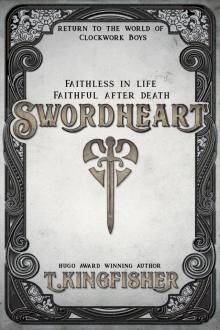 Swordheart
Swordheart Jackalope Wives And Other Stories
Jackalope Wives And Other Stories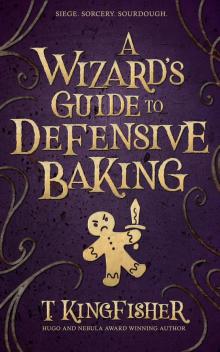 A Wizard's Guide to Defensive Baking
A Wizard's Guide to Defensive Baking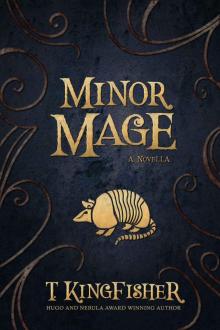 Minor Mage
Minor Mage The Halcyon Fairy Book
The Halcyon Fairy Book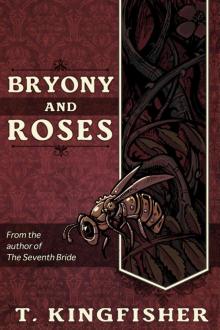 Bryony and Roses
Bryony and Roses The Wonder Engine_Book Two of the Clocktaur War
The Wonder Engine_Book Two of the Clocktaur War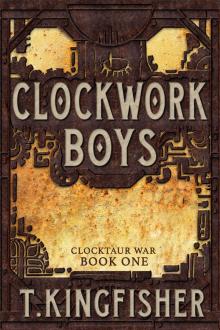 Clockwork Boys: Book One of the Clocktaur War
Clockwork Boys: Book One of the Clocktaur War The Raven and the Reindeer
The Raven and the Reindeer Summer in Orcus
Summer in Orcus The Wonder Engine
The Wonder Engine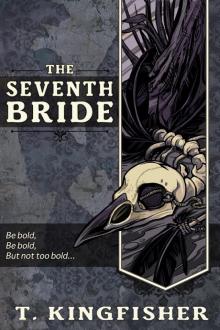 Seventh Bride
Seventh Bride Toad Words
Toad Words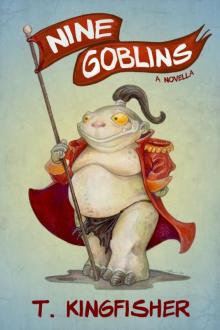 Nine Goblins
Nine Goblins